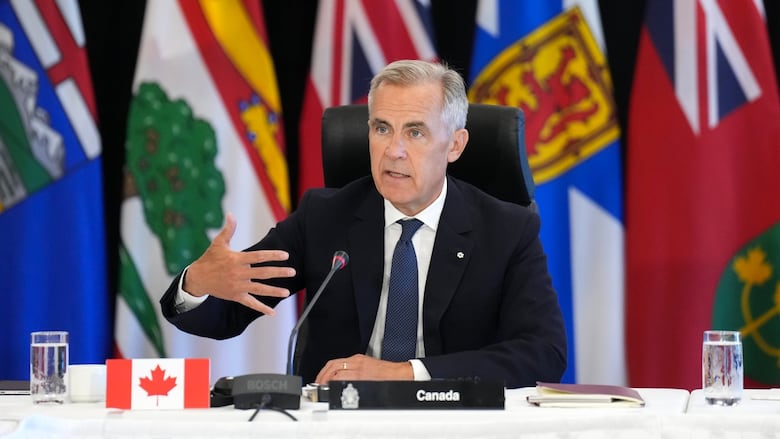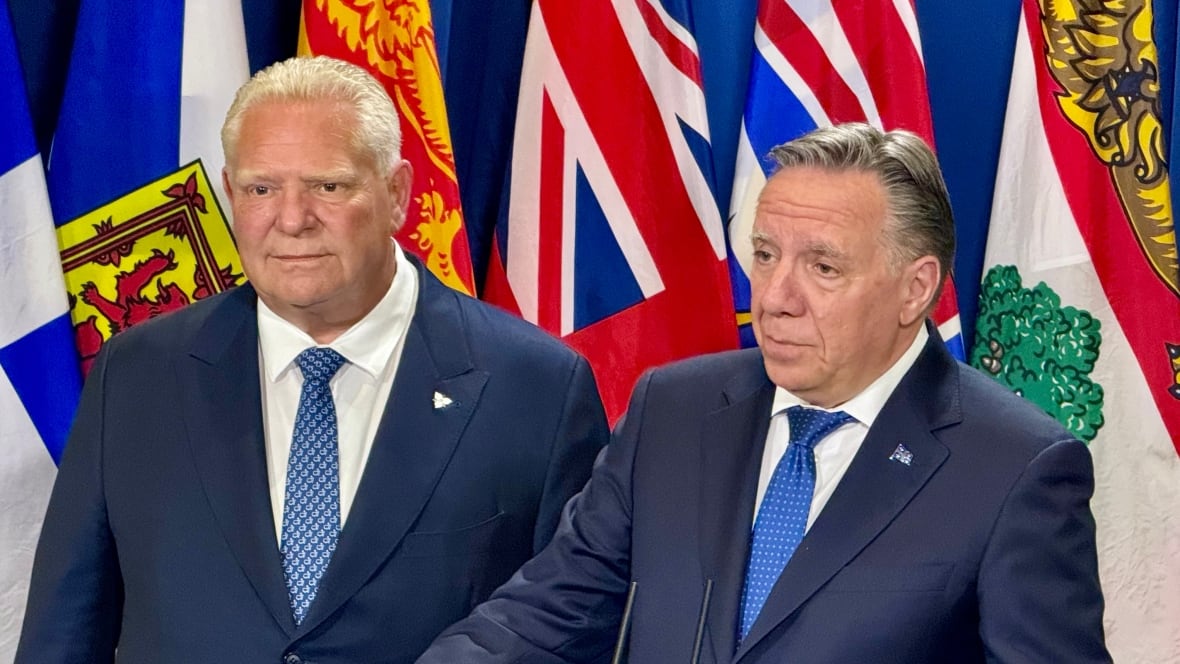Carney tells premiers he'll only sign a U.S. trade deal 'in the best interest of Canadians'
PM says he and premiers are working to strengthen Canada as negotiations continue

The prospect of Canada reaching a trade deal with the United States by the Aug. 1 deadline appears uncertain, with Prime Minister Mark Carney insisting his government will only sign a new agreement if there is one worth signing.
"The Government of Canada will not accept a bad deal," Carney said in French in Huntsville, Ont., Tuesday. "Our objective is not to reach a deal whatever it costs. We are pursuing a deal that will be in the best interest of Canadians."
When it comes to the prospect of reaching a deal, Carney said "we'll see" and that "complex negotiations" continue. He said if there isn't a deal that works for Canada, his government will "take stock" and consider what to do next.
The prime minister made the remarks after dropping into the first ministers' meeting in Ontario's cottage country, where he briefed Canada's premiers on the government's trade discussions with the Trump administration.
Ontario Premier Doug Ford is hosting the premiers for three days of meetings to discuss their own response to the trade war U.S. President Donald Trump launched against Canada.
Carney said that a good deal would reinforce the country's long-standing and successful trading relationship with the U.S. while not preventing Canada from expanding the country's relationships around the world.
"Our phone is ringing off the hook from other countries that want to do more with Canada," Carney said. "I've had over 80 bilaterals with world leaders since I became prime minister. A number of the premiers have been on major trade missions. We have other things to do," he said.
Nova Scotia Premier Tim Houston said after meeting with Carney that he isn't dead set on signing a deal by the deadline — he wants the best deal for Canada regardless of how long it takes.
Houston said he still hopes that is possible and has "tremendous confidence in the prime minister and the team that is representing us as Canadians."
Quebec Premier François Legault said it is "very difficult" to say whether there will be a trade deal with the U.S. by Aug. 1.
"We would like to have the ideal deal," Legault said, "but what can we get? You almost need to ask Donald Trump and I'm not even sure that he knows himself what he wants."
Ford said he still thinks a deal is "realistic" but Canada has to "focus on what's going to strengthen" the economy rather than what Trump will do next.
New Brunswick Premier Susan Holt said she, too, is focused on getting a good deal, not a fast deal.
"I think that's the realization that we've come to in seeing how things have moved with other countries," she said.
Carney arrived in Muskoka on Monday evening to have dinner with the premiers at Ford's cottage, after spending the day hosting a bipartisan delegation of U.S. senators in Ottawa.
Before he went into his meeting with the premiers, Carney said Canada's economic response to Trump's tariffs so far is built on two tracks: supporting affected industries, such as lumber, steel, auto manufacturing and aluminum production; and ensuring Canada's economy grows by breaking down internal trade barriers and quickly approving major projects.
Approving projects like ports, pipelines and mines will be easier now that Bill C-5, or the One Canadian Economy Act, has become law.
Carney said his new federal projects office will be open by Labour Day, which he said will provide a single point of contact for provinces, companies and communities looking to get major nation-building projects approved.
Ensuring energy security
Ford, Saskatchewan Premier Scott Moe and Alberta Premier Danielle Smith signed a memorandum of understanding on Tuesday morning to build new energy and trade infrastructure.
CBC News asked the premiers if Canada needs to replace Line 5 — the more than 1,000-kilometre-long pipeline carrying 540,000 barrels of oil and natural gas liquids daily across Wisconsin and Michigan to refineries in Sarnia, Ont. — regardless of whether there is a private-sector proponent behind such a plan.
"I believe so," Ford said. "We can't rely on the Americans anymore. Simple as that."

Moe said Canada does not want to find itself in the same position as Europe, which recently found out what it means to be heavily reliant on oil and gas from Russia.
"We certainly need to have a very mature discussion about how we can provide Western Canadian oil and gas to Canadians that live in Central and Eastern Canada for our own good," Moe said. "Not only our economic security but our energy security."
Smith said building a pipeline entirely within Canada is "probably something that is long overdue. We probably should have done it decades ago."




